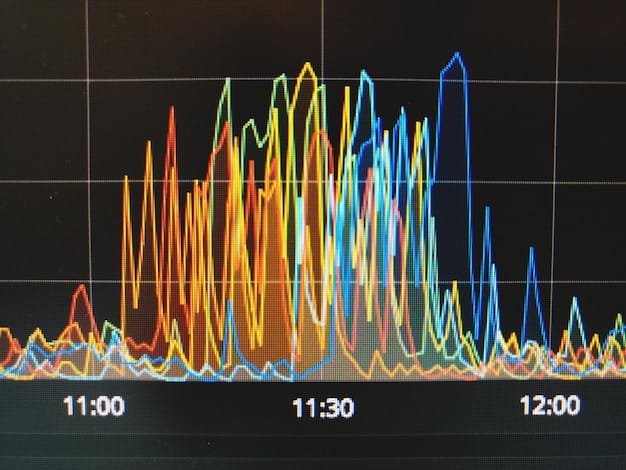Is Binaural Beats Music a Scam? Data-Driven Focus Analysis

Binaural beats are auditory illusions claimed to enhance focus, but scientific evidence supporting these claims remains limited and controversial, prompting a data-driven analysis to determine their efficacy and potential as a focus enhancement tool.
Are you wondering if the claims surrounding binaural beats are too good to be true? This article analyzes the science and data behind whether binaural beats music is a scam? A data-driven analysis of focus enhancement claims.
Understanding Binaural Beats
Binaural beats have become a popular topic in the realm of focus and relaxation techniques. But what exactly are they, and how are they supposed to work? Let’s explore the fundamentals of binaural beats to understand the science behind them.
The Science of Binaural Beats
Binaural beats are auditory illusions created when two different tones are played in each ear simultaneously. The brain perceives a third tone, which is the difference between the two frequencies. This perceived tone is what proponents claim can influence brainwave activity and mental states.
- Frequency Difference: The key to binaural beats lies in the frequency difference between the tones, which is typically between 1 and 30 Hz.
- Brainwave Entrainment: The brain is believed to synchronize its electrical activity with the frequency of the binaural beat, a process known as brainwave entrainment.
- Potential Effects: Depending on the frequency, binaural beats are hypothesized to induce states ranging from deep relaxation (delta waves) to heightened focus (beta waves).
Researchers and enthusiasts suggest that by listening to binaural beats, you can consciously influence your brainwave patterns to promote relaxation, improve focus, or even enhance sleep.

Claims of Enhanced Focus and Cognitive Benefits
The popularity of binaural beats stems from a plethora of claims regarding their ability to enhance mental performance. Focus, memory, and creativity are just a few of the areas where binaural beats are purported to make a difference. But how credible are these claims?
Anecdotal Evidence vs. Scientific Backing
Much of the support for binaural beats comes from anecdotal evidence and personal testimonials. While these accounts can be compelling, they lack the rigor of scientific research.
- Improved Concentration: Many users report that listening to binaural beats helps them stay focused for extended periods.
- Enhanced Memory: Some claim that practicing with binaural beats can lead to better memory retention and recall.
- Boosted Creativity: Individuals have shared that binaural beats promote a more creative and imaginative mindset.
Despite these claims, it’s important to approach them with a critical eye. Scientific studies have yielded mixed results, and the effectiveness of binaural beats may vary from person to person.
Analyzing the Research: What Does the Data Say?
To ascertain whether binaural beats truly live up to the hype, it’s essential to examine the research findings regarding their impact on focus and cognitive function. Let’s dive into a data-driven analysis of the available evidence.
Studies Supporting Binaural Beats
Some studies have demonstrated positive effects of binaural beats on various cognitive outcomes. These findings often depend on the specific frequencies used and the duration of exposure.
- Enhanced Attention: Some research indicates that binaural beats can improve sustained attention and vigilance during cognitive tasks.
- Reduced Anxiety: Certain frequencies have been associated with decreased anxiety levels, which indirectly supports better focus.
- Sleep Improvement: Studies suggest that delta-wave binaural beats may promote deeper and more restful sleep, which can enhance daytime focus.
Limitations and Conflicting Evidence
However, it’s crucial to acknowledge the limitations and conflicting evidence surrounding binaural beats. Many studies have small sample sizes and methodological issues.
While some studies have shown benefits, others have failed to replicate these findings. This inconsistency underscores the need for more rigorous and well-designed research to determine the actual efficacy of binaural beats.

Potential Placebo Effect and Subjectivity
One aspect that can’t be overlooked when assessing the effectiveness of binaural beats is the potential influence of the placebo effect. How much of the reported benefits are due to actual physiological changes versus the individual’s beliefs and expectations?
The Power of Belief
The placebo effect is a well-documented phenomenon in which individuals experience a perceived benefit from a treatment or intervention, even if it has no inherent therapeutic value.
For binaural beats, the expectation of improved focus, relaxation, or cognitive function may lead to an enhanced subjective experience. If individuals believe that the sounds will help them concentrate, they may be more attentive and motivated, thereby boosting their performance.
Individual Variability
It’s also important to recognize that people respond differently to auditory stimuli. Some individuals may be more sensitive to binaural beats, while others may not experience any noticeable effects.
Expert Opinions and Professional Perspectives
To gain a more balanced and nuanced understanding of binaural beats, let’s consider the opinions of experts and professionals in relevant fields, such as neuroscience, psychology, and audiology.
Neurologists and Brainwave Entrainment
Neurologists who specialize in brainwave entrainment techniques often view binaural beats as a potentially useful tool. They emphasize the need for careful consideration and proper application.
These experts underscore the importance of individual differences in brain physiology and cognitive profile. They caution against making sweeping generalizations about the effectiveness of binaural beats for everyone.
Psychologists and Cognitive Enhancement
Psychologists interested in cognitive enhancement techniques take a more cautious approach. They emphasize the importance of evidence-based methods and rigorous scientific validation.
While many psychologists are open to the idea of exploring auditory stimulation for brain training, they stress the need to examine the underlying mechanisms and outcome measures critically.
Practical Ways to Test and Integrate Binaural Beats
If you’re curious about trying binaural beats for yourself, it’s essential to approach it systematically and thoughtfully. Here are practical ways to test and integrate binaural beats into your daily routine.
Set Clear Goals
Before you begin, define what you hope to achieve with binaural beats. Are you looking to improve focus while studying, reduce stress during work, or enhance sleep quality?
Having specific goals in mind will help you gauge whether binaural beats are genuinely making a difference. It also helps you choose the right frequencies and durations for your listening sessions.
Experiment with Different Frequencies
Binaural beats come in various frequency ranges, each associated with different mental states. Experiment with different frequencies to find what works best for you.
- Beta Waves (12-30 Hz): For alertness and focus.
- Alpha Waves (8-12 Hz): For relaxation and creativity.
- Theta Waves (4-8 Hz): For deep relaxation and meditation.
- Delta Waves (0.5-4 Hz): For sleep and restoration.
Document Your Experiences
Keep a journal to track your experiences with binaural beats. Note when you listened to the sounds, what frequencies you used, and how you felt before, during, and after each session.
Documenting your experiences will provide valuable insights into whether binaural beats are making a noticeable impact on your focus, mood, or cognitive function.
| Key Point | Brief Description |
|---|---|
| 🎧 What are Binaural Beats? | Auditory illusions created by playing two different tones in each ear to influence brainwave activity. |
| 🧠 Focus Enhancement Claims | Proponents claim binaural beats enhance focus, memory, and creativity, though scientific support is mixed. |
| 🔬 Research Analysis | Some studies show benefits like improved attention and reduced anxiety, while others find no significant effects. |
| 🤔 Placebo Effect | The expectation of benefits from binaural beats may contribute to a perceived improvement in focus and cognitive function. |
FAQ: Binaural Beats for Focus
▼
Some studies suggest binaural beats can enhance focus and attention, but results are mixed. Individual experiences may vary, and the placebo effect could play a role.
▼
Binaural beats are generally considered safe, but prolonged exposure to loud volumes can damage hearing. Start with low volumes and gradually increase as needed.
▼
The optimal frequency depends on your goals. Experiment to see what works best for you, but limit exposure to avoid overstimulation or desensitization.
▼
Binaural beats can complement other focus techniques like meditation and mindfulness, but they should not replace them. A holistic approach yields the best results.
▼
Beta frequencies (12-30 Hz) are commonly associated with alertness and focus. However, individual responses can vary, so experiment to find what works best for you.
Conclusion
In summary, whether binaural beats music is a scam? A data-driven analysis of focus enhancement claims reveals both promise and limitations. While some studies and anecdotal evidence support their benefits, the scientific evidence remains inconclusive. Individual experiences vary, and the placebo effect plays a role. By setting clear goals, experimenting with frequencies, and documenting your experiences, you can determine if binaural beats are a legitimate tool for enhancing focus and cognitive function.





